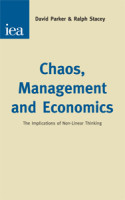 David Parker & Ralph Stacey
David Parker & Ralph Stacey
1. Chaos theory, which is causing a revolution in the natural sciences, has important lessons for the study of how human organisations and economies function.
2. Chaos is an ‘intricate mixture of order and disorder’, in which behaviour patterns are irregular. Nevertheless, broad categories of behaviour can be recognised.
3. Links between causes and effects are more complex than simple linear systems can capture.
4. The behaviour of any system may well be extremely sensitive to its ‘initial conditions’. Such systems cannot be controlled; they ‘evolve through a process of self-organisation’.
5. Because the long-term future is unknowable, managements of both companies and economies should emphasise adaptability and creativity.
6. Competitive markets are vital to the creative process because, unlike planned systems, they provide for ‘spontaneous adaptation’.
7. Enterprise is a ‘locomotive of change’. Chaos theory ‘provides a new argument for the innovating entrepreneur’, which complements the case made by the Austrian school. To cope with chaotic conditions, economies need to promote entrepreneurship.
8. In chaotic conditions, slight errors in demand management may lead to increased economic instability.
9. Companies and economies ‘require structures and institutions which encourage self-transformation’, not detailed plans for long-term futures.
10. Government economic and social policy should ‘complement not conflict with social change’, avoiding policies that ‘reduce the economy’s ability to adapt, including regulation, monopoly and high taxation’.

